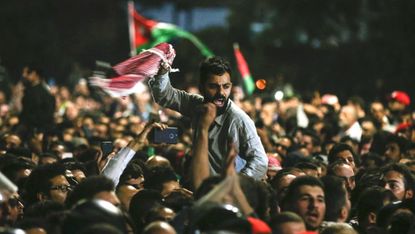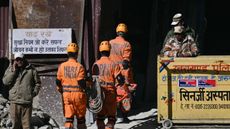Jordan protests: what are they about?
King replaces prime minister in bid to diffuse anti-austerity demonstrations

The King of Jordan has sought to diffuse growing unrest in the country by replacing his prime minister following days of anti-austerity protests.
King Abdullah has asked former World Bank economist Omar al-Razzaz to form a new government after Hani Mulki resigned as prime minister following the country’s biggest demonstrations in years.
In Jordan, “the monarch has extensive powers and can appoint governments and approve legislation”, says the BBC.
Subscribe to The Week
Escape your echo chamber. Get the facts behind the news, plus analysis from multiple perspectives.

Sign up for The Week's Free Newsletters
From our morning news briefing to a weekly Good News Newsletter, get the best of The Week delivered directly to your inbox.
From our morning news briefing to a weekly Good News Newsletter, get the best of The Week delivered directly to your inbox.
What caused the protests?
Planned tax hikes and the abolition of bread subsidies have brought thousands of people out onto the streets over the past week, in a rare show of public defiance in a country that has remained relatively stable through years of regional turmoil.
Security forces have detained 60 people for breaking the law during the protests and 42 security force members had been injured, but police say protests remained under control.
Why are taxes rising?
Reuters says Jordan’s economy has “struggled to grow in the past few years in the face of chronic deficits, as private foreign capital and aid flows have declined”.
The government claims it needs more funds for public services but opponents says the tough IMF-imposed fiscal consolidation plan has worsened the plight of poorer Jordanians and squeezed the middle class.
What happens next?
A general strike has been called for Wednesday, but in a sign the tax hikes could be shelved, the Petra news agency said lawmakers were planning to ask the king’s permission to hold an exceptional session in which a majority were expected to call on the changes be withdrawn.
Create an account with the same email registered to your subscription to unlock access.
Sign up for Today's Best Articles in your inbox
A free daily email with the biggest news stories of the day – and the best features from TheWeek.com
-
 Pros and cons of solar energy
Pros and cons of solar energyPros and cons Solar power could become the primary source of electricity worldwide by 2050 – but there are still clouds in the forecast
By Rebecca Messina, The Week UK Published
-
 Post Office's Capture software to be reviewed over 'glitches'
Post Office's Capture software to be reviewed over 'glitches'Speed Read Solicitor representing accused postmasters says flaws in the IT system follow 'very similar pattern' to Horizon
By Arion McNicoll, The Week UK Published
-
 How would we know if World War Three had started?
How would we know if World War Three had started?Today's Big Question With conflicts in Ukraine, Middle East, Africa and Asia-Pacific, the 'spark' that could ignite all-out war 'already exists'
By Harriet Marsden, The Week UK Published
-
 Judi Dench accidentally video called co-star from bath
Judi Dench accidentally video called co-star from bathTall Tales And other stories from the stranger side of life
By Chas Newkey-Burden, The Week UK Published
-
 Puffed rice and yoga: inside the collapsed tunnel where Indian workers await rescue
Puffed rice and yoga: inside the collapsed tunnel where Indian workers await rescueSpeed Read Workers trapped in collapsed tunnel are suffering from dysentery and anxiety over their rescue
By Sorcha Bradley, The Week UK Published
-
 Gaza hospital blast: What the video evidence shows about who's to blame
Gaza hospital blast: What the video evidence shows about who's to blameSpeed Read Nobody wants to take responsibility for the deadly explosion in the courtyard of Gaza's al-Ahli Hospital. Roll the tape.
By Peter Weber, The Week US Published
-
 Giraffe poo seized after woman wanted to use it to make a necklace
Giraffe poo seized after woman wanted to use it to make a necklaceTall Tales And other stories from the stranger side of life
By Chas Newkey-Burden, The Week UK Published
-
 Helicopter sound arouses crocodiles
Helicopter sound arouses crocodilesTall Tales And other stories from the stranger side of life
By Chas Newkey-Burden, The Week UK Published
-
 Woman sues Disney over 'injurious wedgie'
Woman sues Disney over 'injurious wedgie'Tall Tales And other stories from the stranger side of life
By Chas Newkey-Burden, The Week UK Published
-
 Emotional support alligator turned away from baseball stadium
Emotional support alligator turned away from baseball stadiumTall Tales And other stories from the stranger side of life
By Chas Newkey-Burden, The Week UK Published
-
 Europe's oldest shoes found in Spanish caves
Europe's oldest shoes found in Spanish cavesTall Tales And other stories from the stranger side of life
By Chas Newkey-Burden, The Week UK Published